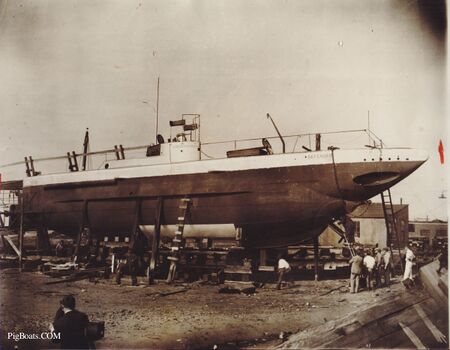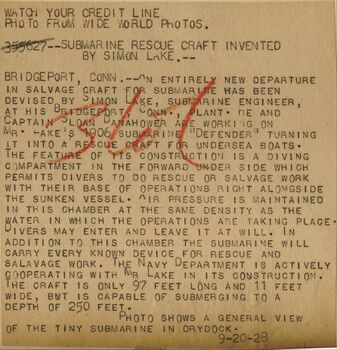Defender: Difference between revisions
Pbcjohnston (talk | contribs) mNo edit summary |
Pbcjohnston (talk | contribs) mNo edit summary |
||
| Line 27: | Line 27: | ||
This photo shows the newly rebuilt Defender, likely at Lake's Bridgeport, CT. yard during the conversion period, approximately 1907-1908. The raked bow seems a little weird looking at first, but is actually a visually attractive feature. There are two cutouts for the exiting torpedoes in the new bow, with the muzzle doors for the tubes remaining in their original location, now buried inside the superstructure. | This photo shows the newly rebuilt Defender, likely at Lake's Bridgeport, CT. yard during the conversion period, approximately 1907-1908. The raked bow seems a little weird looking at first, but is actually a visually attractive feature. There are two cutouts for the exiting torpedoes in the new bow, with the muzzle doors for the tubes remaining in their original location, now buried inside the superstructure. | ||
At this point Defender still has the original midships diving planes | At this point Defender still has the original midships diving planes, folded up alongside the superstructure. | ||
<small>Photo NH 52483 courtesy of NHHC.</small> | <small>Photo NH 52483 courtesy of NHHC.</small> | ||
Revision as of 20:00, 28 August 2024
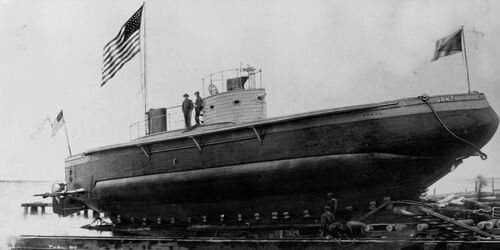
Public domain photo courtesy of Popular Mechanics.

The Lake running on the surface, likely in 1906 during the competition. This is a colorized postcard. The large fairing aft allowed the sub to cruise with decks awash or just submerged with the engines running. The bursts of spray seen at the waterline fore and aft of the conning tower are the diving planes folded up against the hull. The sub also had a set of stern planes.
Photo in the private collection of Ric Hedman.
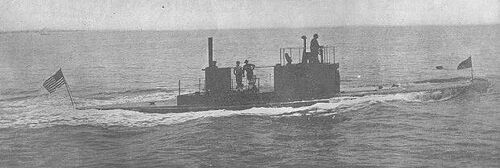
Another view of the Lake running on the surface likely some time in 1906-1907, probably in Long Island Sound. Even fully surfaced she had little reserve buoyancy and ran with her decks nearly awash.
Photo in the private collection of Ric Hedman.
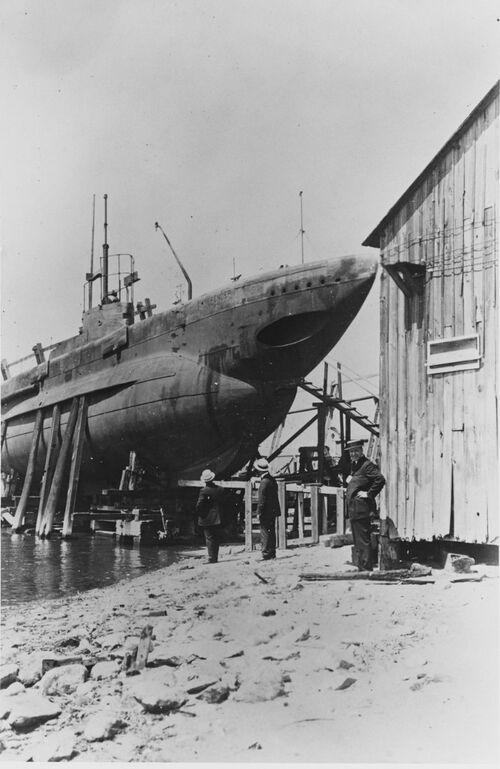
After losing the 1906 competition to the Octopus, Simon Lake brought the boat back to his yard in Bridgeport, CT. and had her heavily modified and updated. She was fitted with a new raked bow and a rebuilt superstructure. The boat was renamed Defender. The story of the Defender gets a bit murky at this point, and what was done with her over the next 20 years is not fully known at this time, but she remained in the ownership of Simon Lake. It is likely that Lake continued to explore the possibility of selling her to the Navy as she retained her torpedo firing capabilities, although she would not have carried any weapons during this period.
This photo shows the newly rebuilt Defender, likely at Lake's Bridgeport, CT. yard during the conversion period, approximately 1907-1908. The raked bow seems a little weird looking at first, but is actually a visually attractive feature. There are two cutouts for the exiting torpedoes in the new bow, with the muzzle doors for the tubes remaining in their original location, now buried inside the superstructure.
At this point Defender still has the original midships diving planes, folded up alongside the superstructure.
Photo NH 52483 courtesy of NHHC.
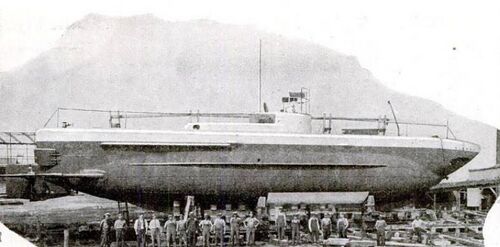
In 1928 Defender was returned to the Lake yard in Bridgeport where she was refitted and updated primarily as a salvage vessel. This photo shows her in 1928 at the end of the modification period. It is interesting to note that the amidships diving planes that the boat had been originally built with (see the photo above) have been removed. The likely reason for this odd change was that as a salvage vessel the boat would actually spend little if any time underway submerged. Instead, she would sail on the surface to the general work area and then submerge straight down to the bottom, moving the rest of the way to the work site on her extended wheels.
Contemporary Popular Science photo via Topwar.com (en.topwar.ru).

A diver emerging from Defender's diving lockout chamber, located below the prow of the boat. Simon Lake (with glasses and moustache) and an associate, possibly his captain Sloan Danenhower, observe. The diver is wearing what could be an Alfred Hale Rubber Company three light, 12 bolt diving helmet, or a Morse three light, 12 bolt rig. Since this is only a demonstration, he is not wearing any weights.
Contemporary Popular Science photo via Topwar.com (en.topwar.ru).
A very nice high-resolution photo of Defender hauled out at Lake's Bridgeport, CT yard, 1928. The man entering the boat through the diver's hatch under the bow is quite possibly Simon Lake himself. This photo was likely taken at the same time as the photos above, as many of the details match. This actual print was purchased from a collector by Ric Hedman. The image on the right is the caption that was attached to the back of the photo. It contains the typical self-promoting hyperbole that Simon Lake was famous for. Despite what the caption says, the Navy did not support this effort in any fashion. By 1928 the small Defender had been technologically surpassed by the submarines the Navy was then operating and the service was utterly disinterested in the boat.
Page created by:
Ric Hedman & David Johnston
1999 - 2023 - PigBoats.COM©
Mountlake Terrace, WA, Norfolk, VA
webmaster at pigboats dot com

